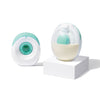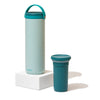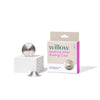Is this normal? Yes! Fluctuations are common and often temporary.
The #1 Fix: Increase Demand.
Your body makes milk based on "orders." To place more orders:
- Add 1-2 extra pumping or nursing sessions per day.
- Try "power pumping" (20 min on, 10 min off, 10 min on) to mimic cluster feeding.
- Ensure your pump is effective: Check your flange fit and that your wearable pump (like Willow 360) has a strong seal and charge.
Reasons for a Sudden Drop:
|
Cause of Drop |
What It Feels Like |
Quick Action |
|
Feeding/Pumping Frequency |
"I skipped a few sessions" or "My baby is distracted." |
Add a power pumping session today. |
|
Hydration/Nutrition |
"I'm constantly thirsty" or "I've been skipping meals." |
Grab a snack and a large glass of water right now. |
|
Stress & Sleep |
"I'm overwhelmed and exhausted." |
Commit to one rest period today. Delegate a chore. |
|
Hormonal Changes |
"My period returned" or "I started new birth control." |
Track it. If it persists for 2 cycles, talk to your doctor. |
|
Pump Issues |
"My output is low, but I feel full." |
Check your flange size and pump parts for wear. |
Support Your Body:
- Hydrate Smartly: Drink to thirst; add electrolytes if you're guzzling water with no results.
- Eat Galactagogues: Oats, leafy greens, healthy fats, and supplements like Oat Mama.
- REST: Stress and sleep deprivation are major culprits. Prioritize rest over a spotless house.
When to Worry
If your baby has fewer than 6 wet diapers/24hrs, seems lethargic, or isn't gaining weight, contact your pediatrician or an IBCLC immediately.
When Your Breast Milk Supply Suddenly Drops
If you’ve ever woken up and noticed that your milk supply seems lower overnight, you’re not alone. Sudden dips in breast milk production are common, and while they can be frustrating and even scary, they’re usually temporary and fixable.
There are many reasons your milk supply might drop — from stress and hormones to hydration and feeding patterns. The key is identifying the cause and making small adjustments to help your body rebalance.
We asked International Board-Certified Lactation Consultant (IBCLC) Wendy Wright for her insight on what can cause a decrease in supply and what you can do to bring it back.
Is It Normal for My Milk Supply to Decrease?
Yes, fluctuations in milk supply are completely normal. Your body responds to your baby’s needs, so it’s natural for your supply to shift from day to day or week to week.
If your baby continues to feed regularly and seems content after nursing, minor dips in supply usually aren’t a concern. Still, it’s helpful to track your baby’s feeding habits, diaper changes, and overall mood. If you notice major changes in output or behavior, it’s a good idea to check in with your pediatrician or lactation consultant.
Signs of Low or Decreasing Milk Supply
A temporary dip is normal, but if your baby isn’t getting enough nourishment, you may start to see signs that your supply needs a boost.
Common signs include:
- Your baby isn’t gaining or is slowly gaining weight
- Fewer wet or dirty diapers than usual
- Your baby seems fussy, tired, or frustrated during feeds
- Your baby’s soft spot (fontanelle) looks slightly sunken
-
Your baby cries without tears or has a dry mouth
If you suspect dehydration or a consistent low supply, reach out to your pediatrician or lactation consultant as soon as possible.
Here are some of the most common causes of a sudden drop in milk supply:
Breast milk production works on a supply-and-demand basis — the more milk you remove, the more your body produces. A dip in supply often happens when something interferes with that cycle.
Hormonal Changes
Fluctuations in hormones can influence milk production. Starting a new birth control pill (especially those containing estrogen), your menstrual cycle returning, or thyroid imbalances can temporarily reduce supply. Talk to your doctor if you notice timing patterns with hormonal shifts.
Feeding or Pumping Frequency
Not pumping or feeding often enough sends a signal to your body that less milk is needed. Skipping sessions, shortening feeds, or switching to formula too frequently can cause your supply to dip.
Try adding one or two extra sessions daily to help restore demand.
Hydration and Nutrition
Your milk supply depends on hydration and nourishment. While dehydration can cause a noticeable dip, drinking too much water can also affect hormonal balance and electrolyte regulation. Aim for steady hydration throughout the day, not overconsumption.
Make sure you’re eating enough, too — breastfeeding requires an extra 200–500 calories per day of nutritious foods like lean proteins, whole grains, and healthy fats.
Stress and Lack of Sleep
High stress and low sleep affect your hormones, letdown reflex, and overall energy — all of which can reduce supply. Try to rest when your baby naps and take time for small self-care breaks, even if it’s just a few minutes of deep breathing.
Baby’s Developmental Changes
As your baby grows, distractions, teething, or changes in latch can cause feeding inconsistencies. These temporary dips often resolve once your baby adjusts. If latching becomes painful or irregular, an IBCLC can help assess the cause.
Introducing Solid Foods
As your baby starts solids, their milk intake may naturally decline. This transition is gradual, but you might notice a mild drop as your baby’s diet expands.
What Can I Do to Help My Milk Supply Recover?
The most effective way to boost your milk supply is to remove milk more often. Whether through nursing or pumping, your body increases production in response to frequent emptying.
Try these expert-approved tips:
-
Add an extra pumping session or two each day.
- Nurse on demand when your baby shows hunger cues.
- Try a “nursing vacation” — spend 2–3 days focusing on rest, hydration, and frequent feeding.
- Massage or use a warm compress on your breasts before pumping to stimulate flow.
-
Make sure your pump flange size is correct and your pump is functioning properly (like Willow Go or Willow 360).
If you’re unsure how long to pump, aim for 15–20 minutes per session, or continue until milk flow slows noticeably.
Foods and Supplements That May Help Increase Milk Supply
Certain foods, herbs, and supplements — known as galactagogues — have been shown to support milk production.
Try incorporating:
- Oatmeal and whole grains
- Fenugreek and moringa
- Leafy greens like spinach and kale
- Healthy fats like avocados and nuts
-
Oat Mama’s Lactation Supplement, which includes milk-boosting herbs such as alfalfa, goat’s rue, milk thistle, and spirulina.
Always consult your healthcare provider before taking supplements to ensure they’re right for you and your baby.
Expert Tip: Pair Milk Boosting with Self-Care
Sometimes the best thing you can do to support your supply is take care of yourself. Eat well, drink enough water, rest whenever possible, and give yourself grace. Stressing about low supply can make things worse — remember that your body is resilient and adaptable.
You’re doing an incredible job, mama.
FAQs
-
Is it normal for my milk supply to drop suddenly?
Yes. It’s common for milk supply to fluctuate from time to time, especially if you’re tired, dehydrated, or your feeding schedule changes. Most dips are temporary and can be corrected with frequent nursing, rest, and hydration. -
How can I tell if my baby is getting enough milk?
Track your baby’s diapers and feeding cues. If they’re producing enough wet diapers, gaining weight, and seem content after feeding, your supply is likely fine. If they seem unusually fussy, lethargic, or dehydrated, talk to your pediatrician. -
Can stress cause a drop in breast milk supply?
Absolutely. Stress hormones like cortisol can interfere with milk letdown and production. Try to rest, delegate chores when possible, and find small ways to unwind daily. -
Can dehydration affect milk supply?
Yes. Your milk is primarily made of water, so if you’re not drinking enough fluids, your supply may dip. Drink regularly throughout the day, but don’t overhydrate — too much water can also affect your body’s balance. -
Can heat or hot weather lower my milk supply?
Hot weather itself doesn’t directly affect milk production, but dehydration does. Since your body sweats more in summer, it’s easy to become dehydrated without realizing it. Keep water nearby and sip often to stay hydrated. -
How does hydration help with milk supply?
Staying hydrated supports the natural production of breast milk, which is nearly 90% water. Dehydration can slow milk flow and make pumping or feeding sessions less productive. Pair fluids with nutrient-rich snacks like fruit or yogurt for extra energy. -
What are the best foods to boost milk supply?
Oatmeal, fenugreek, almonds, leafy greens, and lean proteins can all help. Small, frequent meals with balanced nutrients also support healthy supply and energy. -
When should I contact a doctor or lactation consultant?
If your supply doesn’t recover after a few days, or your baby shows signs of dehydration or poor weight gain, reach out to your doctor or an IBCLC for personalized guidance.
Make Boosting Your Supply Effortless
When your milk supply dips, the solution is simple in theory—remove more milk, more often. But in practice, finding the time and energy for extra pumping sessions can feel overwhelming, especially when you're already stressed and exhausted.
This is where the right pump can make all the difference. The Willow 360™ Wearable Breast Pump is designed to fit pumping into your life, not the other way around. Its true, 100% cord- and tube-free design lets you pump discreetly while you hydrate, prepare a milk-boosting snack, or even cuddle your baby—making it easier than ever to follow the "increase demand" advice.
With the Willow 360, you can:
- Easily Add a Session: Pump hands-free while making a healthy meal or managing daycare drop-off, seamlessly adding that crucial extra session to your day.
- Pump Comfortably: Its Instant Expression Mode helps trigger letdowns quickly, which is especially helpful when stress is making it difficult.
- Stay Consistent: By removing the barriers of being tethered to a wall, the Willow 3.0 helps you stick to your pumping schedule, sending your body the consistent signals it needs to ramp up production.
For more expert-backed guidance on increasing and protecting your milk supply, explore our Willow Blog.





